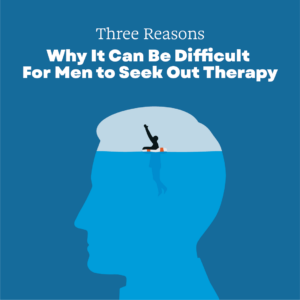Three Reasons Why It Can Be Difficult For Men to Seek Out Therapy
 Men, it is OK to reach out for help. Asking for help is not easy, especially when topics are sensitive, and you may feel vulnerable. Brene Brown, Ph.D.’s research from the last two decades shows that there is no courage without vulnerability. I am encouraged by all the brave men who are taking steps towards bettering their relationships and strengthening their families by addressing mental health and underlying concerns such as substance use.
Men, it is OK to reach out for help. Asking for help is not easy, especially when topics are sensitive, and you may feel vulnerable. Brene Brown, Ph.D.’s research from the last two decades shows that there is no courage without vulnerability. I am encouraged by all the brave men who are taking steps towards bettering their relationships and strengthening their families by addressing mental health and underlying concerns such as substance use.
“The definition of vulnerability is uncertainty, risk, and emotional exposure. But vulnerability is not weakness; it’s our most accurate measure of courage.”
–Brene Brown
Here are three reasons why it can be difficult for men to seek out therapy:
Gender Socialization
In the United States, men traditionally have been socialized not to express feelings and to “fix the problem” and “figure things out”. Socialization practices include stoicism (enduring pain without the display of feelings or complaints), self-reliant independence, and solitary problem-solving. While there are both positive and negative aspects to these characteristics, a negative aspect is that seeking and accepting help for problems can be very hard to do. Men may feel like they need to figure things out on their own, without relying on others and without presenting as “weak”. This can lead to a lack of receiving effective treatment for conditions related to physical and mental health needs. Nearly 1 in 10 men experience depression or anxiety but less than half will receive treatment.
Pre-existing Beliefs and Stereotypes
Messaging and beliefs, often influenced by gender socialization such as “real men don’t cry” can make it challenging to become vulnerable with others, especially in the context of therapy. Sports is one outlet where a lot of men feel like they have permission to experience a variety of feelings, including crying in competitive sports as this is one place where it seems socially acceptable.
Stereotypes about men as aggressors and abusers can also make it challenging for men to reach out for support when they have experienced victimization. It is important to challenge pre-existing beliefs and stereotypes, recognizing that men can be victims of abuse too. The National Domestic Violence Hotline sees a smaller percentage of male callers, although reminds us that there are likely many men who either do not report abuse or do not seek help for their abuse for a variety of reasons.
Experiences Seeking Support
It can take time to find someone that you feel comfortable talking to, someone who validates your experiences and helps meet the needs that you are seeking when reaching out. Men may believe that there are no people or supports available for them. They may also fear that their experiences may be treated as less serious. Discomfort with opening up, along with avoidance of uncomfortable emotions can make it especially challenging to disclose topics such as sexual abuse. Suppression of emotions and engaging in unhealthy coping strategies such as drinking may feel like safer alternatives.
Reaching out for help for the first time does involve an element of risk, but it is important to be reminded that vulnerability is a measure of courage, not weakness. CARECounseling is seeing more men actively seek therapy. Our therapists will meet you where you are while building upon your strengths, resiliency, and courage. After learning more about the reason for reaching out, symptoms present, and the impact on how these areas impact work, school, relationships, and important aspects of your life, your therapist will help create an individual plan with you, focused on your goals. We are committed to reducing the societal stigma that is often present in help-seeking for men and creating a space where all are comfortable. With a highly skilled team of over 200 therapists, CARE is here to help you find a good fit.
Written By: Charlotte Johnson, MA, LPCC



























